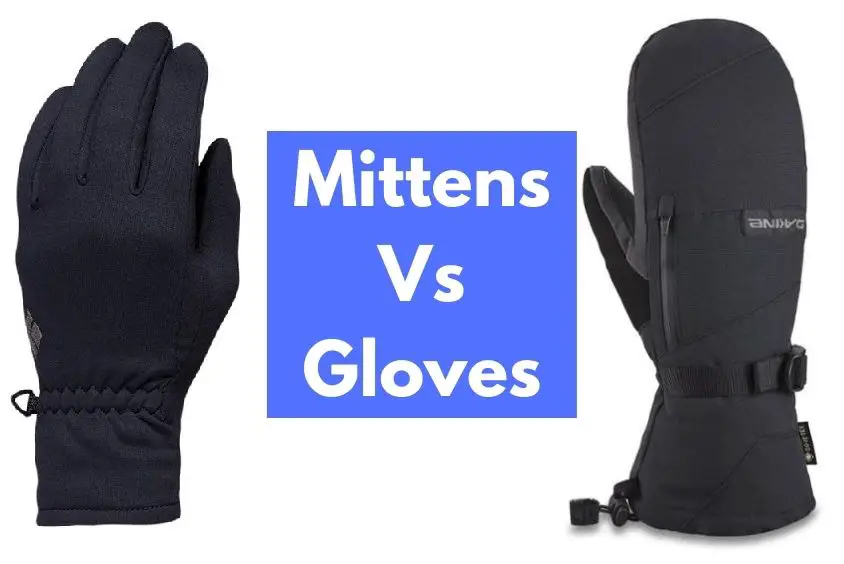There is a lot of confusion about the difference between mittens vs gloves. Do you know which one is warmer? And when should you use them? In this blog post, we will clear up all of the confusion and help you understand when to mittens or gloves.
Mittens Vs Gloves: What’s The Difference
Mittens and gloves may seem like they serve the same purpose but there are actually some key differences between the two.
Lets go over the difference between mittens and gloves below.
Mittens
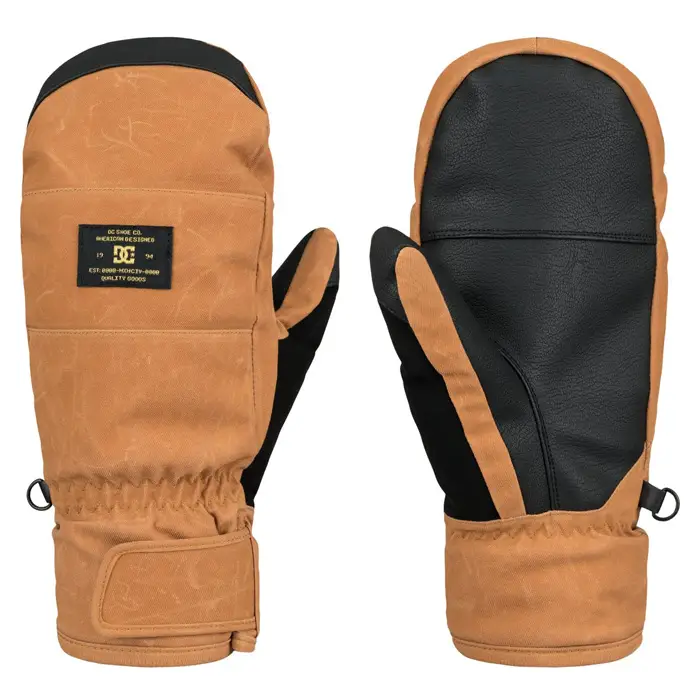
For starters, mittens are generally warmer than gloves because they allow your fingers to share body heat. This is due to the design of mittens which have the thumb separate from the rest of the fingers.
Gloves
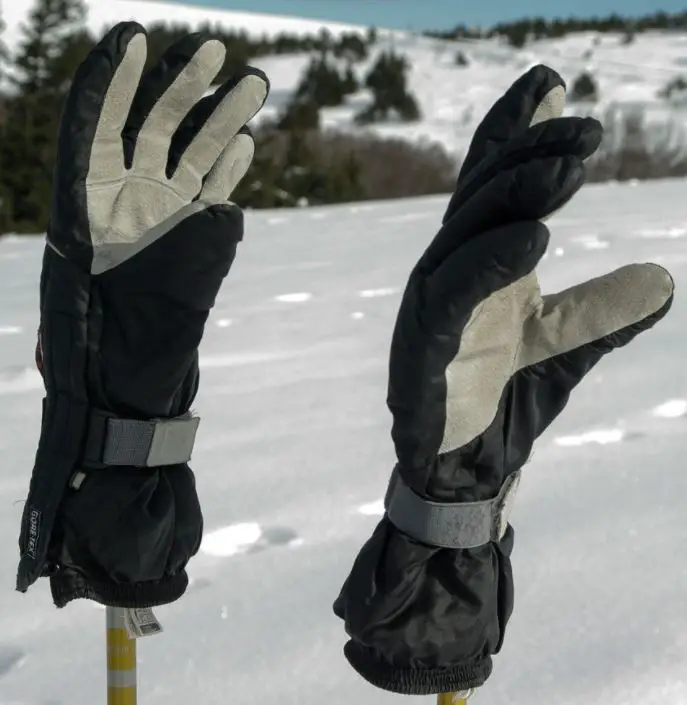
Gloves, on the other hand, have each finger separate from one another which doesn’t allow for as much heat to be shared, but it does give you a lot of dexterity for things like handling gear.
Lobster Gloves
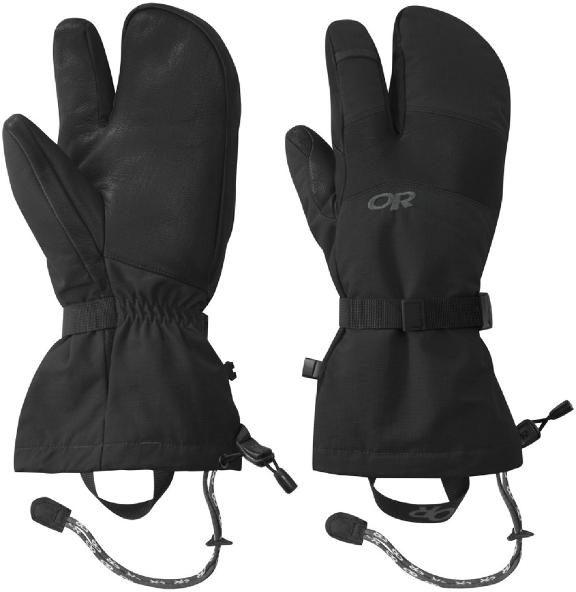
Lobster gloves are a hybrid between the two designs and offer the best of both worlds. They have the thumb and index finger separate from the rest of the fingers like gloves, and have the remaining three fingers grouped together.
This is an ideal combination of warmth and dexterity, which keeps you from having to choose between gloves vs mittens.
3-In-1 Combo
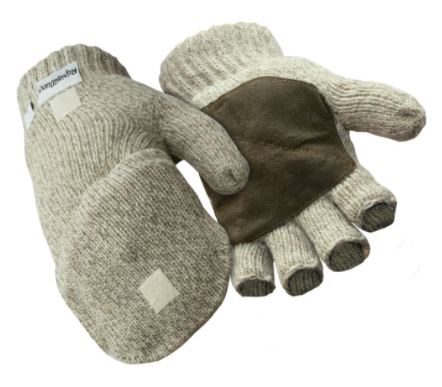
If you’re still not sure which is the best option for you, there’s always the classic glove and mitten combo. This gives you the option to wear them together when it’s cold or use them separately when you need more dexterity.
Are Mittens Warmer Than Gloves?
So, now that we know a bit more about the two types of insulation, are gloves or mittens warmer? The answer is mittens are warmer than gloves.
Wait… why are mittens warmer than gloves?
Mittens are warmer than gloves because they allow your fingers to share body heat.
This is due to the design of mittens which have the thumb separate from the rest of the fingers.
Gloves have each finger separated from one another which doesn’t allow for as much heat to be shared and has extra heat loss due to more exposed surface area.
There are also less seams on mittens. Seams allow an opportunity for heat to leak out, so less seams = warmer hands.
Mitt Vs Glove: Choosing The Right One For Your Activity
Because mittens and gloves each have their pros and cons, they’re each going to be better for different types of outdoor activities.
We’ll walk through whether gloves or mittens are better for different outdoor sports and other uses below.
Mittens Vs Gloves for Skiing

Gloves are better for skiing because they offer more dexterity for handling ski poles, grabbing your skis, undoing bindings, and handling other gear.
Mittens or lobster gloves can also work fine, but they may take a little getting used to, but they’re not going to offer as sure of a grip on skiing poles like gloves will.
If you’re skiing in warm weather, you might find mittens are too warm compared to gloves.
Whether you choose gloves or mittens for skiing, we’d recommend going with a pair that has great waterproofing and uses synthetic insulation.
Mittens Vs Gloves for Snowboarding

So, why do snowboarders wear mittens?
Mittens are better for snowboarding because of the added warmth they provide.
There’s not much need for the dexterity offered by gloves unless you’re putting on or taking off your bindings.
Most gloves or mittens for snowboarding also have reinforced palms and knuckles because of the added abuse they’ll take while you’re doing your bindings or stopping on your hands several times each snowboarding trip.
Hiking In Mittens Vs Gloves

Hiking is one of those activities where it really depends on personal preference. If it’s cool out, then hiking gloves may be the way to go as they offer more dexterity for holding hiking poles or getting into your daypack.
Alternatively, if you’ll be hiking in cold weather and not using hiking poles, mittens will help keep your hands extra toasty on the trail.
You may opt for a 3-in-1 mitten/glove combo when hiking, and some hikers even use hiking glove liners for an added layer of warmth and protection.
Gloves Vs Mittens: Insulation Types
There are two main types of insulation for both gloves and mittens: down and synthetic.
Down is made from the soft undercoating of ducks and geese and has a great warmth-to-weight ratio. It’s also breathable, lightweight, and can be compressed easily, but doesn’t work that well once it gets wet.
Synthetic insulation is made from polyester fibers. Synthetic insulation is more affordable, performs better when wet, and dries faster, but is a bit bulkier and loses it’s insulating power a little bit each time it’s compressed.
Mittens Versus Gloves: Common Features
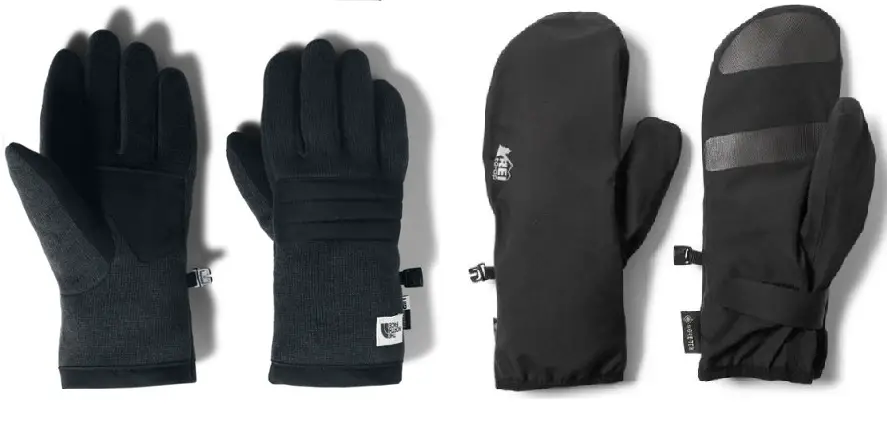
Whether you’re deciding between gloves or mittens, there are a few common features you’ll find in each:
Liners are available whether you’re choosing gloves versus mittens, and most often they’ll be made of GORE-TEX which offer breathability to keep your hands dry while keeping moisture out.
Wrist cinches pull the gloves tight at the wrist to help keep warm air inside and provide a better fit.
Long cuffs (also called gauntlets) extend over your sleeves to keep air and snow from getting in your mittens or gloves.
Zippered pockets on the back of the gloves and mittens can hold hand warmers in for extra warmth.
Leather palms aid in better grip for grabbing poles or handling gear.
Thumb wipes are on the top of the thumb and are made for wiping your nose when it runs during cold weather.
Leashes and wrist cords keep your gloves secure to your wrists or jacket so they don’t fall off.
Mittens Vs Gloves: Wrapping Things Up
Now that you know a little more about gloves vs mittens, which do you think is better for your needs?
Do you prefer the dexterity of gloves or the added warmth of mittens, and what activity do you use them with?
Share your thoughts in the comments below.
Check out our other helpful cold-weather guides while you’re here:
- The best heated ski socks
- The best winter tents with stoves
- The best insulated tents
- The best heated camping chairs

